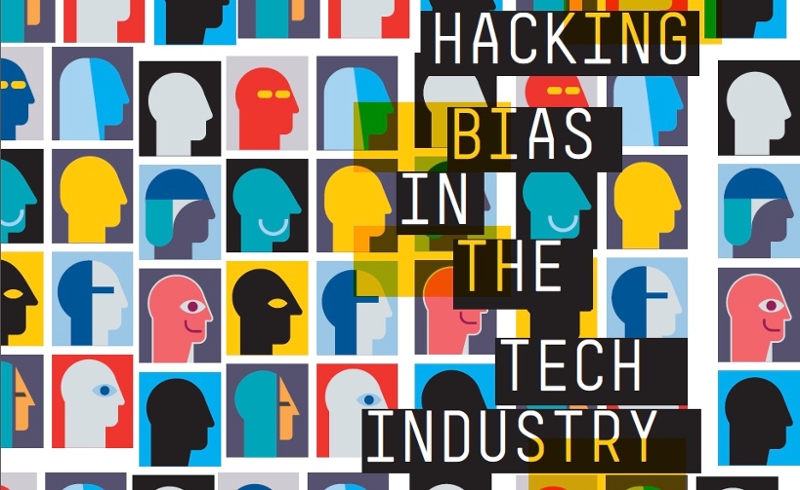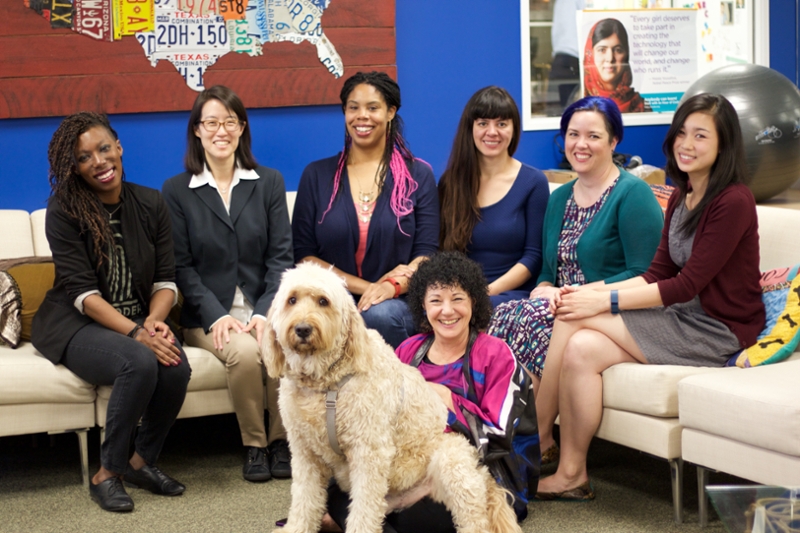By Bethany Romano
This article appears in the Winter 2016 issue of Heller Magazine.

The prevailing mythology
The U.S. tech industry thrives on a mantra of competitive innovation, and for many decades has been on a trajectory to disrupt every field and every sector. The tech innovations born in Silicon Valley have lengthened our life spans and changed the ways we conduct transactions, listen to music, talk to our loved ones, buy our groceries and do our jobs. Tech employers are often lauded for adopting nontraditional work styles and embracing drastic changes to the workplace in an effort to enhance employee engagement and performance.
And yet in one aspect, the tech industry remains stubbornly archaic: The composition of the sector itself is overwhelmingly white or Asian and male. And the numbers aren’t moving.
In 2014 a number of large tech companies released their diversity numbers to the general public for the first time. Scanning the list, it wasn’t uncommon to see companies with an African-American or Latino workforce of just 2 percent, or a female workforce of less than a quarter of the total employed. Attrition rates were alarmingly high. In an industry where new hires come largely through referrals, the numbers bore out that tech employees are a largely homogeneous group.
“Diversity efforts in corporate America have failed miserably, despite billions of dollars and countless hours spent on diversity initiatives,” says Freada Kapor Klein, PhD’84. “I found it particularly interesting, having been in the business world, that nobody got fired because their diversity efforts had failed. I didn’t know of any other serious business initiative where, year in and year out, they’d miss their targets and nothing would happen.”
Why, in an industry built on innovation and progressive ideals, do diversity and inclusion efforts fail? “There’s a prevailing mythology in the tech industry that tech, more than any other sector, is a meritocracy,” says Kapor Klein, who is based in Oakland, Calif. “So the concept of hidden bias flies in the face of people who regard themselves as smart and innovative. If you believe you’re a meritocracy, then you don’t have to pay any attention to diversity and inclusion efforts.”
Roots in activism
Kapor Klein co-founded the first group focused on sexual harassment in the United States, the Alliance Against Sexual Coercion, in Cambridge, Massachusetts, in 1976. As a leading figure in the U.S. women’s rights movement, she was featured in The New York Times and Ms. Magazine in 1977 for her work alongside that of Gloria Steinem. In addition to organizing speak-outs and trainings and publishing information booklets, she contributed to several chapters of the pioneering book “Our Bodies, Ourselves.”
Kapor Klein enrolled in the Heller School’s PhD program in 1981 with her dissertation topic already in mind: As an adviser on a research study, she had acquired data for over 20,000 federal government employees, and she used that data set to conduct the first methodologically rigorous study of sexual harassment in the workplace.
After receiving her PhD in social policy and research, Kapor Klein joined the Lotus Development Corporation, where her job was “to make Lotus the most progressive employer in the U.S., which is the coolest job description ever,” she says. “The world would be a better place if more companies had that mandate.”
After Lotus, she founded Klein Associates, a consulting firm specializing in reducing bias, harassment and discrimination in work environments. Her clients included McKinsey, Goldman Sachs, the United Nations, the World Bank and Harvard Business School. She then became a partner at Kapor Capital, a venture-capital firm that invests in startups that generate positive social impact. She also founded the Level Playing Field Institute (LPFI) in Oakland, a nonprofit organization focused on closing the gap of access and opportunity for people of color in STEM. LPFI’s flagship program is SMASH (Summer Math and Science Honors Academy), a free, fully residential, STEM-acceleration college-preparatory program for underrepresented high school youth of color now based at five universities in the U.S.
Bringing research to the table
Along the way, Kapor Klein contributed a sorely needed resource to workplace diversity and inclusion efforts everywhere: sound academic research. In 1988 she conducted a study of sexual harassment in Fortune 500 companies that received extensive press coverage. As a result, she was on standby for NBC with news anchor Tom Brokaw throughout Clarence Thomas’ Supreme Court confirmation hearing. Kapor Klein had agreed to be an expert witness for Anita Hill’s side, though like many of Hill’s witnesses, she was not called to testify.
Brandeis professor Anita Hill and Kapor Klein have since crossed paths many times. Of Kapor Klein, Hill says, “She is a perfect living example of passion, practice and a lifelong commitment to equality aligning. From her path-breaking work validating women’s experience with sexual harassment and assault in her early writings and advocacy, to making STEM careers possible for students of color with the SMASH Academy, to putting diversity and inclusion in the tech industry on the fast track with Project Include, Freada continually reminds us how to be the change we want to see in the world.”
Kapor Klein has used her Heller education to systematically explore hidden bias and to measure the interventions and bias-mitigation strategies that actually work. “My research training has been invaluable,” she says. “Developing an interdisciplinary approach to thinking about these issues has also been critical.”
At the Level Playing Field Institute, Kapor Klein and her team conduct critical research into hidden bias, discrimination and the root causes of the tech industry’s diversity problem. For decades, the lack of diversity in tech has been blamed on an inadequate pipeline of talented young people moving into STEM fields. Kapor Klein says, “Despite all the excuses that persist today that it’s a pipeline problem, it really isn’t. We’ve found that if one designs careful programs that are research-based, one can very quickly, and at scale, solve the pipeline problem.”
A big part of solving it has to do with confronting the hidden biases that influence who enters the tech world — and who stays. “Like so many other things, having an accurate analysis of the problem and its contours is a prerequisite to fixing it,” says Kapor Klein. “Since the conversation has focused in a simplistic way on whether it’s a pipeline problem or not, there hasn’t been enough time or effort spent on doing rigorous research to understand all of the nuance.
“There’s a lot that we presume to be objective that turns out to be highly biased. Everything from the structure of a job interview to how somebody’s performance is evaluated to the criteria for promotion — each and every step of the employee life cycle is riddled with bias, and we pretend that if we somehow construct a point system and give a number to a bunch of subjective criteria, that we’ll magically have transformed it into being objective. That’s nonsense.”

The founders of Project Include (top, left to right): Y-Vonne Hutchinson, Ellen Pao, Erica Joy Baker, Laura Gomez, Bethanye McKinney Blount and Tracy Chou, and (front) Freada Kapor Klein with her dog, Dudley. Susan Wu, the group's eighth member, is not pictured.
Project Include
Armed with her decades of research and experience, in May 2016 she entered into a new endeavor. Convened by Ellen Pao, Kapor Klein and six other prominent women in the tech industry founded Project Include, a nonprofit organization whose tagline is “to give everyone a fair chance to succeed in tech.”
Project Include works with tech companies to help them improve diversity and inclusion throughout the employee life cycle. Together, they’ve created an extensive handbook of recommendations that provides companies with the tools to create an overall inclusion strategy and to support employees not just in the recruitment process but throughout their entire time in the company. Of Project Include’s co-founders, Kapor Klein says, “The majority of them are engineers and have worked at major tech companies, including Google, Facebook, Twitter, Slack, Pinterest, Quora — a large roster of important companies. It is our lived experience in tech, which totals 150 years, that informs the 87 recommendations we put together.”
Project Include’s recommendations are heavily grounded in the many years of research that Kapor Klein has contributed to this field. Y-Vonne Hutchinson, a Project Include co-founder and executive director of ReadySet, says, “One of the biggest challenges in this work is that there’s no such thing as a PhD in diversity and inclusion, really. You can get graduate education on labor relations, you can study workplace issues generally, but people aren’t necessarily trained to look at these issues in a scientific way. Freada is one of the unique souls who has gotten a PhD and applied it to tech, and in that sense she’s quite rare. I think she’s one of the most knowledgeable people working on this issue.”
Project Include also runs Startup Include, a small cohort of tech startups from which Project Include is culling diversity and inclusion data over time. “We’re working in a data-driven industry, and it’s really important to use the tools at our disposal to tackle the diversity and inclusion challenges that we see,” says Hutchinson. “Six months from now we’ll survey them a second time. We hope we’ll be able to show that we have had a targeted, measurable impact over a relatively short period of time.” The Project Include team also has plans underway to launch a similar cohort program for venture-capital firms.
Building solutions
Although workplace diversity and inclusion efforts are, of course, not restricted to tech, Kapor Klein feels that the tech industry is where innovation happens. “I believe that all companies are becoming tech companies. It is impossible in 2016 to be in any sector and not look at ways in which technology will disrupt your business or enhance your business. Technology has for many decades been on a march to transform every industry. A lot of the success of mitigating bias is going to rely on actually using tech tools to fix tech bias — tools that can review and flag job descriptions for biased language, tools that can provide anonymity in the interview processes,” she says.
“I wouldn’t be doing this work for this many decades if I weren’t fundamentally an optimist. I have been and remain an advocate for social and racial justice, and therefore I am an optimist.”
